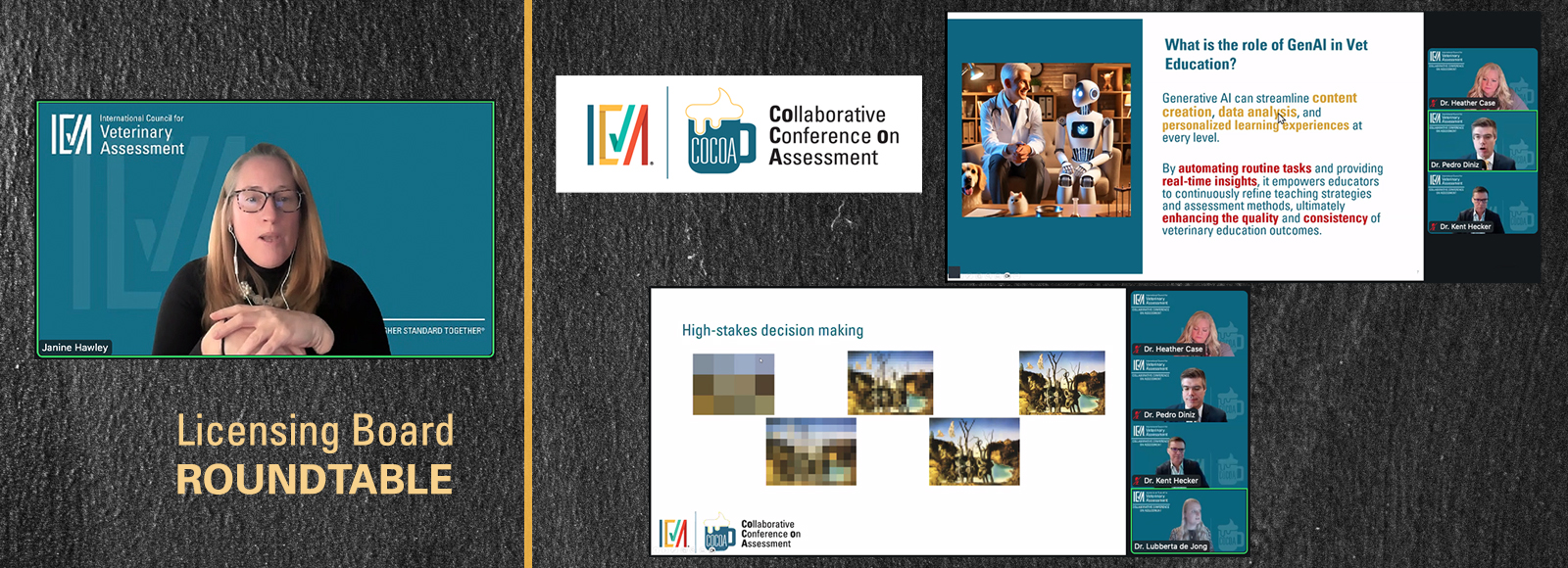
Webinars Launched for ICVA Stakeholders
ICVA’s strategic priorities include an emphasis on continuing to develop relationships with organizational stakeholder groups. One way to achieve this is by offering opportunities for those in the veterinary arena to learn more about assessments and to tap into the expertise of ICVA staff and volunteers. Recently, ICVA has hosted webinars to initiate what it hopes will become regular gatherings for stakeholders interested in veterinary assessment topics.
Licensing Agency Roundtable
On February 20, ICVA hosted the first in a series of roundtables covering a variety of assessment-related topics of interest to the veterinary regulatory community. Moderated by ICVA Chief Operating Officer Janine Hawley, the virtual session focused on the updated NAVLE retake policy. More than 51 individuals from veterinary regulatory agencies representing 30 states and provinces across the U.S. and Canada participated in the inaugural event.
The roundtable series was created in response to discussions with licensing agency staff and volunteers, followed by a survey to assess interest and identify priority topics for veterinary regulators.
During the session, ICVA provided insights into the NAVLE retake policy, which limits candidates to five attempts. This policy was not introduced to prevent qualified individuals from becoming licensed veterinarians but rather to mitigate risks associated with unlimited attempts on any assessment.
Participants also discussed the discretion licensing agencies have in accepting or declining appeals from candidates. While some jurisdictions require acceptance of a passing NAVLE score, they do not specify a limit on the number of attempts.
To improve clarity in future communications, ICVA will replace the term “appeal” with “requesting/granting a waiver.”
"We had a question at the end asking if agency staff would like to have a quarterly roundtable discussion. Janine and I used to participate in similar discussions on the human medicine side, and they were incredibly valuable for sharing information and best practices among licensing agencies. I’m excited to bring this format to the veterinary field." – Baylor Harton, ICVA Program Operations Manager
ICVA appreciates the opportunity for discussion, sharing of best practices, and co-creation of solutions. We will incorporate participant feedback to enhance our retake policy processes, making it easier for both licensing agency staff and the candidates in their jurisdictions. The next roundtable will be held in the second quarter of 2025.
Collaborative Conference on Assessment
ICVA’s Academic Veterinary Assessment Committee (AVAC) created the Collaborative Conference on Assessment (COCOA) as a recurring forum to address the evolving and critical needs in veterinary education assessment. The series reflects AVAC’s commitment to supporting meaningful dialogue and advancing the veterinary community’s understanding of assessment practices.
The first webinar, held on February 27, brought together 158 participants from 53 schools across 11 countries, including Australia, Brazil, Canada, Germany, Grenada, Ireland, Israel, Saint Kitts and Nevis, Trinidad and Tobago, the United Kingdom, and the United States.
The session featured two expert presentations. Dr. Pedro Diniz from Western University delivered a talk titled “Fostering Continuous Quality Improvement with Gen AI,” sharing how AI can be utilized in assessment in various ways, from creating podcasts to providing feedback to students. He also discussed how AI can be used to analyze SOAP notes in the veterinary teaching context, allowing students to receive more timely feedback. Additionally, he emphasized the importance of recognizing AI’s limitations, such as hallucinations (providing false information).
Dr. Lubberta de Jong from Utrecht University presented on “Implementing a Programmatic Approach to Assessment in Veterinary Curricula.” She shared that creating assessment programs allows many data points to paint a full picture of a student’s abilities and that formative assessments play a central role in some programmatic assessment processes. It was also discussed that while assessment fatigue is a consideration, much of developing an assessment program involves developing a culture of assessment.
Following the presentations, participants engaged in a Q&A session and open discussion. Key questions included advice for faculty and administrators new to AI, how to handle AI hallucinations when using it for teaching or recommending its use for study guides, whether students struggle with the cognitive load and mental health implications of frequent assessments, and how institutions gained faculty buy-in for program-level outcomes and assessments.
“The conference was a success. It was inspiring to bring together participants from around the world to explore evolving topics in veterinary assessment and the impact of innovative new practices on the field.” – Dr. Pedro Diniz
The AVAC will review feedback from attendees to determine the timing and topics for future sessions.
